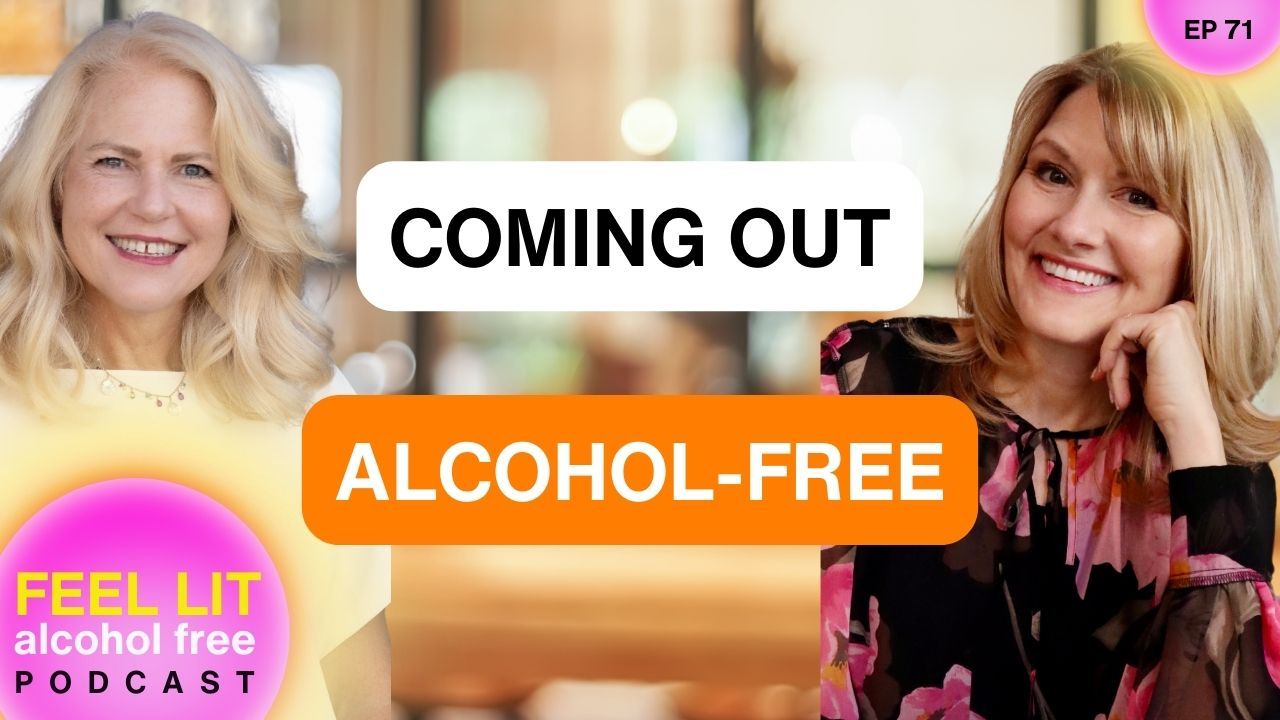Ep. 71 Coming Out Alcohol-Free: How to Tell Your Friends & Family You’re Not Drinking
May 20, 2025
Listen to the PODCAST Here
Watch the Podcast on YouTube Here
Coming Out Alcohol-Free: Navigating Social Conversations and Embracing Authenticity
Introduction: Going Public with Your Alcohol-Free Journey
Choosing to live alcohol-free is a deeply personal decision, but sharing that choice with others can often be the hardest part of the journey. Whether you’re worried about social gatherings, family traditions, or simply the reactions of long-time friends, coming out as alcohol free can feel daunting. In a recent episode of the _Feel Lit Alcohol Free Podcast_, hosts and coaches Ruby Williams and Susan Larkin dive deep into their own stories and offer practical advice on how to approach these conversations with confidence and compassion—for yourself and those you love.
The Social Hurdle: Why “Coming Out” Feels So Big
For many, alcohol is entwined with social identity. It can represent family rituals, girls’ nights, or workplace camaraderie. When you decide to stop drinking, it’s normal to wonder how friends and family will react, especially if you were known as the person always bringing the wine or encouraging toasts. Both Ruby and Susan share that the prospect of telling their loved ones was filled with anxiety: Would they think it was a phase? Would it make socializing awkward? Would abstaining spotlight others’ drinking habits?
Ruby, who comes from the wine industry, recalls worrying that her decision would be seen as hypocritical. Susan, too, remembers feeling like she might disappoint her family or make gatherings uncomfortable. Their stories highlight a crucial point: changing your relationship with alcohol can feel like changing a small part of your identity—and it’s natural for this to bring up fears around acceptance and understanding.
Strategies for Sharing: Finding Your “Elevator Pitch”
One of the most helpful tools discussed in the episode is the concept of an “elevator pitch”—a simple, honest, and positive way to express your alcohol-free choice without needing to over-explain or justify. Both Susan and Ruby recommend personalizing your approach. For some, this might be as straightforward as saying, “I feel better without alcohol,” or “I’m focusing on my health right now.” Others might lean on specific reasons, such as improved sleep, reduced anxiety, or a desire to lose weight.
Ruby shares how she initially told people she was on a keto diet, which was true, and didn’t lead to probing questions. Over time, as her confidence grew, she opened up to more people about the deeper reasons behind her decision. Susan echoes the importance of going at your own pace and not feeling pressured to share more than you’re ready for.
Practice your response so it becomes second nature, they suggest. If you’d rather avoid the topic entirely in some settings, it’s okay to simply order a non-alcoholic drink and move the conversation along. Remember: you owe no one an explanation for your self-care.
The Power of Going Slow and Individual Conversations
Not every friend or family member needs to be told at once. Ruby describes how she intentionally had one-on-one conversations with her loved ones over time, choosing the right moment for each person. This allowed her to control the pace and the narrative, and led to some surprising and supportive responses—including a brother who shared he too was practicing an alcohol-free lifestyle.
Susan emphasizes that, while some reactions may be awkward or tinged with initial disappointment, people generally adjust. With time, your alcohol-free identity becomes “the new normal” to those around you—and you may even inspire quiet curiosity or support in unexpected places.
Mindset Shifts: Redefining Social Confidence
A key takeaway from both coaches is the importance of reframing your own beliefs. Instead of worrying about what others think, focus on your own growth and wellbeing. Many of us do things differently from our social circle—be it dietary habits, hobbies, or parenting styles—and rarely feel a need to justify those choices. Your alcohol-free journey can be approached the same way.
Sharing your story, when you choose to, also helps reduce stigma and fosters honest conversations in your community. But it’s equally valid to keep it private or selective, sharing only when and with whom you feel comfortable.
Embracing the Present: The Joy of Being Alcohol Free
Lastly, Ruby and Susan remind us that being present—truly enjoying the current moment—is one of the greatest gifts of living alcohol free. Whether practicing mindfulness, savoring sober social events, or simply knowing you’re honoring your authentic self, the journey offers countless benefits. Over time, you’ll likely find the anxiety around “coming out” fades, replaced by a refreshing sense of freedom.
Conclusion
“Coming out” as alcohol free is a process, not a one-time event. Take things at your own pace, arm yourself with a prepared response, and remember that you’re making a powerful choice for your health and happiness. With compassion and authenticity, you’ll help normalize—and maybe even celebrate—a lifestyle that truly lets you feel lit.
_____
Listeners have said that our podcast has helped them get alcohol free! So we created Feel Lit 21, a way for you to press your reset button and take a 21 day break from alcohol. Every day you will receive emails with videos, journal prompts, and the inspiration you need to embrace 21 days without alcohol that feels lit!
https://feellitpodcast.com/FeelLit21-sg
Find community and connection on the Feel Lit Alcohol Free Facebook Page: https://www.facebook.com/groups/feellitalcoholfreepodcast
Ruby Williams at Freedom Renegade Coaching https://www.freedomrenegadecoaching.com/
Follow Coach Ruby: @rubywilliamscoaching
Email: [email protected]
